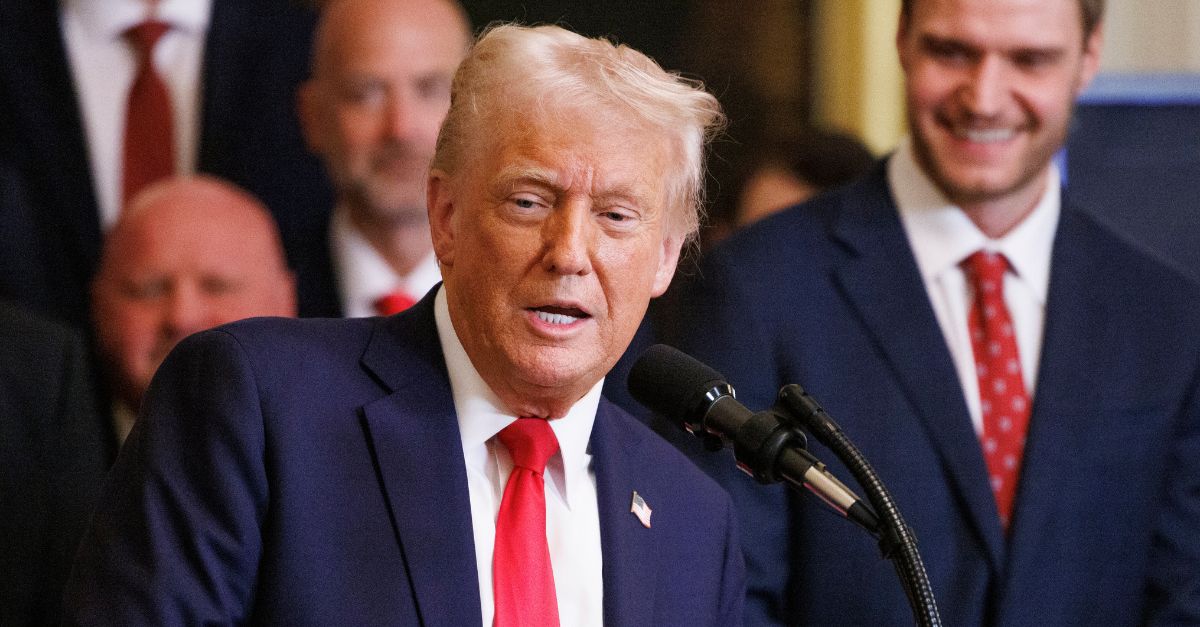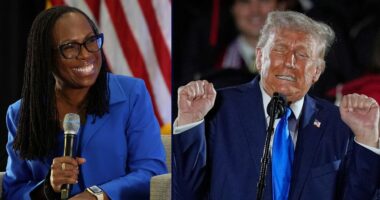
President Donald Trump gives remarks during an event celebrating the 2024 Stanley Cup Champion the Florida Panthers in the East Room of the White House in Washington, DC on Monday, February 3, 2025 (Photo by Aaron Schwartz/Sipa USA)(Sipa via AP Images).
The Trump administration on Friday signaled its intent to appeal one of two nationwide injunctions barring the government from enacting a proposed ban on birthright citizenship.
In as many days this week, two different federal district courts issued orders that prohibit federal agencies from implementing or enforcing President Donald Trump’s Executive Order 14160.
On Wednesday, Baltimore-based U.S. District Judge Deborah Boardman, a Joe Biden appointee, issued the first injunction — in a case brought by several undocumented pregnant women.
On Thursday, Seattle-based U.S. District John Coughenour, a Ronald Reagan appointee, issued the second injunction — in a case brought by Washington, Arizona, Illinois and Oregon. This injunction followed Coughenour’s issuance of a temporary restraining order issued in late January — which was the first court order to bar the policy.
While Coughenour’s temporary restraining order had a 14-day expiration date, a preliminary injunction will typically last until the case itself is ruled upon or the pause is overturned by an appellate court.
“Citizenship by birth is an unequivocal Constitutional right,” the injunction reads. “It is one of the precious principles that makes the United States the great nation that it is. The President cannot change, limit, or qualify this Constitutional right via an executive order.”
On Friday, the U.S. Department of Justice filed a notice of appeal in the Washington case. The threadbare filing does not contain any legal arguments but simply alerts the lower court that a case will be filed. As of this writing, the appeal is docketed with the U.S. Court of Appeals for the Ninth Circuit — but no filings are publicly available.
To date, the government has not yet appealed the injunction filed in the Maryland case. This case is stylized as Casa Inc. v. Trump — named for one of two civil rights groups representing the pregnant plaintiffs.
During a hearing over the injunction in the Western District of Washington on Thursday, attorneys for both sides clashed over the proper interpretation of the 14th Amendment which, in real terms, has long been understood to grant automatic to all persons born in the United States except for the children of foreign diplomats.
“When we ratified the 14th Amendment, we rendered a collective judgment and a promise that would guide our nation into the future,” an attorney for the states summarized. “There was a judgment that we should never again accept the idea that some people born here are less than others in the eyes of the law. And it was a promise that citizenship at birth is beyond the power of the government to take away or destroy. The president and the executive branch cannot alone undo that judgment or that promise.”
Drew Ensign, a DOJ attorney, pushed back.
“This case turns on the critical phrase ‘subject to the jurisdiction thereof’ in the Citizenship Clause,” he argued. “On that issue, plaintiffs offer a construction of that phrase that is demonstrably and unequivocally incorrect.”
The first section of the 14th Amendment reads, in full:
All persons born or naturalized in the United States, and subject to the jurisdiction thereof, are citizens of the United States and of the State wherein they reside. No State shall make or enforce any law which shall abridge the privileges or immunities of citizens of the United States; nor shall any State deprive any person of life, liberty, or property, without due process of law; nor deny to any person within its jurisdiction the equal protection of the laws.
The Trump administration lawyer went on to say the automatic grant of citizenship only applies “to those in the allegiance and under the protection of the country.” This understanding, the DOJ argues, does not extend citizenship to a child born in the country to an undocumented mother — unless the father has some form of legal status.
“Wong Kim Ark made clear that all persons while in this country, other than those specific exceptions that were listed, are subject to its jurisdiction,” another attorney for the plaintiffs argued at the hearing — citing the U.S. Supreme Court case considered the binding precedent on the issue. “And this is true even of a person who is residing temporarily or an undocumented person.”
The next court to parse the issue is the country’s largest court of appeals. The issue, in some form, is widely expected to make its way to the nation’s high court sooner rather than later.






